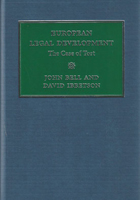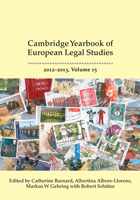Outputs from Research Grant Funded Research and from Faculty Centre Activities
Bell and Ibbetson: European Legal Development: The Case of Tort

This is the concluding volume of Bell and Ibbetson's 9 volume series arising from their AHRC-funded European Legal Development Project (2005-8). The series involved chapters by 56 different authors, 4 from Cambridge, 15 from UK universities and 37 from outside the UK.
Allan, The Sovereignty of Law: Freedom, Constitution, and Common Law (Oxford University Press, 2013)
The Sovereignty of Law offers a defence of the influential idea of common law constitutionalism. Written during the tenure of a Leverhulme Major Research Fellowship, the new book explores the nature of the British constitution as systematic corpus of common law principle: it articulates the internal, interpretative perspective from which, in the author's view, persuasive legal reasoning must proceed. Fundamental principles of the rule of law, legislative supremacy, separation of powers, and democracy are mutually supportive elements of a theory of law that underpins and informs every specific judgement about legal rights, duties, and powers.
Similar themes are explored in Allan's recent essays: 'Accountability to Law' in Nicholas Bamforth and Peter Leyland (eds), Accountability in the Contemporary Constitution (Oxford University Press, 2013); and 'Democracy, Legality, and Proportionality' in Huscroft, Miller, and Webber (eds), Proportionality and the Rule of Law: Rights, Justification, Reasoning (Cambridge University Press, 2014). Allan has also recently contributed an essay, entitled 'Freedom, Equality, Legality', to a new collection of essays entitled The Legal Doctrines of the Rule of Law and the Legal State (Rechtsstaat), (eds) Silkenat, Barenboim, and Hickey (Springer, 2014, forthcoming).
Cambridge Yearbook of European Legal Studies, Volume 15

Hart Publishing, Oxford, has published the fifteenth volume of Cambridge Yearbook of European Legal Studies edited by Catherine Barnard, Albertina Albors-Llorens, Markus Gehring with Robert Schütze.
The papers presented are at the cutting edge of the fields which they address, and reflect the views of recognised experts drawn from the University world, legal practice, and the institutions of both the EU and its Member States. Inclusion of the comparative dimension brings a fresh perspective to the study of European law, and highlights the effects of globalisation of the law more generally, and the resulting cross fertilisation of norms and ideas that has occurred among previously sovereign and separate legal orders.
Faculty Centre Spotlight: CELS Research
European law can be analysed in a variety of ways and across an increasingly diverse areas of scholarship. The work of colleagues working within the Centre for European Legal Studies is at the forefront of contemporary European legal scholarship. EU competition law is one of the founding fields of EU law scholarship yet it can be explored in different ways. Building on work funded through a British Academy Mid-Career Fellowship on the application of competition law within the National Health Service, Oke Odudu is currently engaged on a long-term project on the Open Public Services Agenda that explores the role of EU law and competition law in the allocation of resources to public service providers. Albertina Albors-Llorens approaches EU competition law from the perspective of its relationship to consumer law. Her 2014 article in the Yearbook of European Law maps the co-evolution of consumer and competition law, and in collaboration with Alison Jones of King’s College London she is developing research on the images of the consumer within competition law in a project organized by the Oxford Institute of European and Comparative Law.
If competition law is a founding field of EU law then family law is one of the newer domains of European legal scholarship. Jens Scherpe’s book on Marital Agreements and Private Autonomy in Comparative Perspective (Hart) illustrates the value of comparative European legal research in the developing areas of matrimonial and family law. Such is the growth of this field that he is editing a Research Handbook on European Family Law soon to be published by Edward Elgar. The European economic crisis has also generated new scholarship. CELS Director, Kenneth Armstrong has published a number of pieces that explore the effects of the crisis in creating complex interactions between different modes and different instruments of EU governance and their implications for EU and national law. These examples illustrate a broader phenomenon of pluralization in law and governance which in an essay in honour of David M. Trubek are explored in their EU context: 'New Governance in the European Union: an Empirical and Conceptual Critique' in Critical Legal Perspectives on Global Governance (Hart). The crisis has also been a central focus for enquiry for Alicia Hinarejos. Supported by a CRASSH Fellowship, her forthcoming monograph on The Euro Area Crisis in Constitutional Perspective (Oxford UP) evaluates the long-term consequences of the crisis for the EUs constitutional order.
Cambridge and CELS has a particularly proud tradition of legal scholarship on European labour law and its interaction with EU internal market principles. Amy Ludlow's innovative new book on Privatising Public Prisons (Hart) illustrates the interaction between internal market law in the form of EU public procurement rules and labour law in the form of rules protecting workers in the event of a transfer of an undertaking.

 Facebook
Facebook  X/Twitter
X/Twitter  Instagram
Instagram  YouTube
YouTube  Flickr
Flickr  LinkedIn
LinkedIn